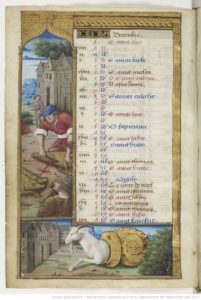
“December”, kalendar page from Les Petites Heures d’Anne de Bretagne (The Little Hours of Queen Anne of Bretagne), by the Maître des Triomphes de Pétrarque. From Bibliothèque nationale de France, Paris (France).
Nicholas was noted for his generosity. After his parents died, he distributed their wealth to the poor. He also saved three daughters of a devout man from being forced into prostitution, by secretly throwing purses of gold coins into their window at night, enabling the man to provide proper dowries. He delivered the money secretly, partly out of modestly, and partly to spare the family the humiliation of accepting charity.
As bishop of Myra, Nicholas was dedicated to rooting out injustice. He saved three men who had been condemned to death by the local governer by pushing the executioner’s sword to the ground and chastising a juror who had accepted a bribe. Nicholas is also said to have attended the First Council of Nicaea, where the supported Trinitarianism against Arianism—even going so far as to slap “a certain Arian” in the face during one of the debates.
Nicholas’s feast day is 6 December. Because of his reputation for giving presents to children, this has become a gift-giving holiday in much of Europe. Celebrations in medieval England also included selecting “boy bishops” to preside over the celebrations. The Dutch celebrations of Saint Nicholas, knownas “Sinterklass”, came with the Dutch to New Amsterdam, later New York, and the Dutch name evolved into “Santa Claus”.


